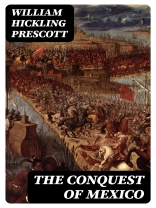In ‘The Conquest of Mexico, ‘ William Hickling Prescott offers a vivid and meticulous account of the Spanish conquest of the Aztec Empire, intertwining historical detail with rich narrative flair. Prescott’s literary style is characterized by its elegance and erudition, capturing the complexities of this monumental event through detailed descriptions and profound insight into the cultural and political dynamics of 16th-century Mexico. The book not only serves as a historical chronicle but also as a reflection on the nature of power, exploration, and the tragic consequences of imperial ambition, positioning it within the broader context of colonial studies and Enlightenment thought. Prescott, an American historian and a significant figure in early historical writing, was notably impacted by the Romantic ideals of his time, which emphasized the grandeur of human experience and the intricacies of cultural encounters. His own struggles with health and eyesight only heightened his resolve to uncover and narrate the past. His dedication to thorough research and his fascination with Spanish and Mexican history led him to delve into this captivating subject, resulting in a work that is as informative as it is compelling. ‘The Conquest of Mexico’ is highly recommended for readers seeking a nuanced understanding of historical narratives and cross-cultural interactions. Prescott’s masterful storytelling not only brings the past to life but also invites reflection on the legacies of colonization today, making it an essential read for history enthusiasts and scholars alike.
About the author
William Hickling Prescott (May 4, 1796 – January 28, 1859) was an eminent American historian, renowned for his comprehensive works on Spanish and Spanish-American colonial history. Despite enduring significant visual impairment from an early age, Prescott’s tenacious pursuit of scholarship enabled him to produce meticulously researched historical narratives. His prose is recognized not only for its scholarly rigor but also for its eloquence and vivid storytelling, capturing the complexity of historical events and figures with a literary flair uncommon in historical writing. Prescott’s most acclaimed work, ‘The Conquest of Mexico’ (1843), delves into the demise of the Aztec Empire at the hands of Hernán Cortés and his troops, providing an account that intertwines military conquest with ethnographic observation and political analysis. The breadth of his research, often relying on primary sources, and his narrative skill placed him at the forefront of historiography in his era and helped shape the field of history as a literary art form as well as an academic pursuit. His other significant works include ‘The History of the Reign of Ferdinand and Isabella the Catholic’ (1837) and ‘The History of the Conquest of Peru’ (1847), both of which further cemented his reputation as a leading historian of his time, and paved the way for future scholarly inquiry into the Spanish Empire and its legacy.












